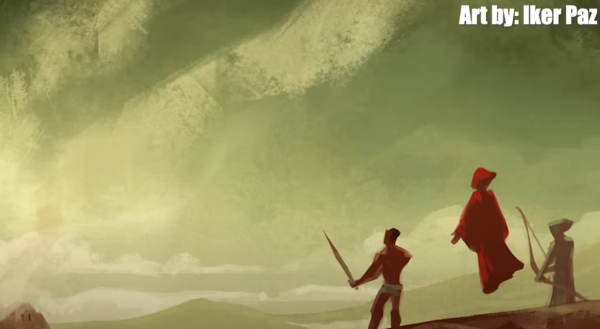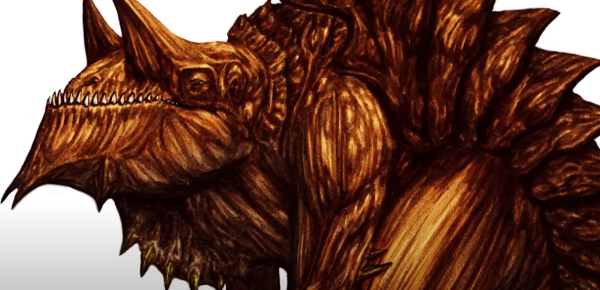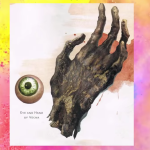Being that there are a handful of tools at a Monk’s disposal, this guide will comprise the best tools a Monk would be able to use. Keep in mind that this list also takes into the consideration of all the tools- not just the tools that the Monk is proficient in. That being said, this list will go from worst to best.
Monks are free to choose which Artisan tools, since this list is nothing but subjective to what I believe would be the best choices.
Note: Monks usually prioritize their Wisdom despite having Dexterity and Strength as their saving throws since their Wisdom modifier helps out with their AC and Ki points. Most tools don’t benefit Strength or Dexterity, so choosing tools based on Wisdom would be the best bet.
- Components: a sextant, a compass, calipers, a ruler, parchment, ink, and a quill
- Checks: Survival
- Special Use: Sighting
These tools are extremely conditional to the type of adventure, which in this scenario, would be an ocean-based adventure. Usually, a DM would prep the party beforehand of whether or not the party would be most on a boat. If the party does end up as a sea adventure, though, this tool could have the potential to be the best tool to have on a monk despite the monk not being proficient in it.
Example: The party’s guide back to the city was rendered unconscious after fighting a vicious ocean monster. To make sure that they can get the captain back into stable condition and get back to civilization, the monk can use their Navigator’s Tools to guide the ship.

9. Cook’s Utensils
- Components: a metal pot, knives, forks, a stirring spoon, and a ladle
- Checks: History, Medicine, Survival
- Special Use: Prepare Meals
It’s always nice to have more healing from short rests and with these tools, it really just makes the monk a lot more useful. There are Survival (Wisdom) checks when it comes to foraging for food, which the Monk shouldn’t have a problem with. It can also be a game changer when it comes to regenerating health and making the team feel more obligated to keep the monk alive.
Example: After a long day of adventuring, the party has lost a significant amount of health and is in need of a long rest. However, the party knows that they definitely do not have enough hit dice to make up for the damage they took. The monk decides to cook a meal for everyone to let them regenerate more health during their short rest. Now, they can venture on with a little less stress on their shoulders about being knocked unconscious.
8. Gaming Kit
- Components: all the pieces to play a specific game like a complete deck of cards, or a board and tokens
- Checks: History, Insight, Sleight of Hand
- Special Use: N/A
Gaming sets aren’t used that often within sessions nor do they hold a lot of importance within an adventure. Regardless, it does hone a good portion of the monk’s skills such as Sleight of Hand (Dexterity) and Insight (Wisdom). It’s not very common for monks to pursue this kind of hobby, but it’s great for weeding out cheaters or people who are hoaxing the nearby hub.
Example: A noble has been going around taking possessions and gold from commoners through an underground gambling system. The Queen ordered the party to check up on the establishment and figure out how everyone manages to keep losing. Essentially, the party must beat him at his own game and catch him cheating.
7. Herbalism Kit
- Components: pouches to store herbs, clippers, leather gloves, mortar and pestle, and several glass jars
- Checks: Arcana, Investigation, Medicine, Natural and Survival
- Special Use: Identify Plants
It makes sense for a monk to be in tune with their surroundings, similar to a druid. Monks should be doing well with Survival checks and therefore making it easier to identify plants.
The rest of the checks needed won’t exactly be the best since Monk’s don’t mainly focus on Intelligence. That, and the fact that the monk wouldn’t be proficient in the Herbalism Kit is also why it’s ranked so lowly. Nonetheless, the monk can always help with supporting their team even more.
Example: A handful of the party is in desperate need for ailments due to the amount of times they’ve been poisoned within the swamps that they have yet to escape from. The monk will then pull out their Herbalism Kit and try to identify any plants that could help cure the party from the poisons and possibly look for plants that can help with giving resistance to said poisons as well.

6. Calligrapher’s Supplies
- Components: ink, a dozen sheets of parchment, and three quills
- Checks: Arcana, History
- Special Use: Decipher Treasure Map
Perception checks are often used in adventures while traveling. Even if there is nothing to spot, a Monk can use their perception check to also determine their surroundings. This way, the Monk can figure out if they went the right way on a map the party has acquired. Greatly used in one-shots where the party is a wild goose hunt.
Example: The Monk can be the guide while navigating an unfamiliar temple. Him and his party found a map outside of the temple, but all of it all twisted and curved. Regardless, the Monk is able to decipher the Treasure Map and guide the party to the gold.
5. Musical Instrument
- Components: Self-explanatory
- Checks: History, Performance
- Special Use: Compose a Tune
A monk becomes proficient with either an artisan tool or a musical instrument. While the musical instrument doesn’t really matter when it comes to what type, it might seem a bit strange for a Monk to use an instrument when they don’t primarily focus on Charisma.
However, this is mostly on the list solely due to character traits, alignments, and stories. For the most part, though, it’s mainly for roleplaying purposes and therefore, just for fun.
Example: A party stumbles into the tavern that is in dire need of a mood lifter. The bard is off somewhere (who knows where he goes off to), so the Monk pulls out his flute and plays a peppy song to bring everyone in the tavern a small smile.
4. Carpenter’s Tools
- Components: a saw, a hammer, nails, a hatchet, a square, a ruler, an adze, a plane, and a chisel
- Checks: History, Investigation, Perception, Stealth
- Special Use: Fortify, Temporary Shelter
This is one of the only tools that actually synergizes with the monk really well when it comes to modifiers. It helps spot irregularities in wooden walls or floors in case there are any traps (Perception) and makes it easier to Stealth across weak spots in the floor to avoid noise when being stepped on. To top it all off, the monk can always have a home with the temporary shelter and fortify ability.
Example: The party is exploring an old house that used to belong to a band of mercenaries from long ago. There are a handful of traps scattered around the house along with a few hostile creatures that roam the corridors. The monk will swiftly do a quick scan of the nearby rooms for traps while not being detected. Then, to make sure they’re not followed, the monk will fortify the door behind them.
3. Thieves’ Tools
- Components: a small file, a set of lock picks, a small mirror mounted on a metal handle, a set of narrow-bladed scissors, and a pair of pliers
- Checks: History, Investigation, Perception
- Special Use: Set a Trap
One of the rare tools that can put the Monk’s saves to good use. Unless the rogue of the party is not present, the Monk shouldn’t have a problem unlocking doors either.
It’s greatly paired as well due to the Monk’s Wisdom modifier being able to make Perception (Wisdom) checks to determine if there are any traps around. Although the Monk may not be proficient with these tools from the start, it will come in handy nonetheless.
Example: The party stumbles into a nearby forest that the nearby village uses for hunting. With that in mind, the party has to make sure not to step on any bear traps. With a perception check, the Monk is able to not only figure out where the traps are, but also disable them.
2. Poisoner’s Kit
- Components: glass vials, a mortar and pestle, chemicals, and a glass stirring rod
- Checks: History, Investigation, Perception, Medicine, Natural, Survival
- Special Use: Handle Poison
Poisons and poison checks are based on Wisdom and Wisdom modifiers. Therefore, it’s safe to assume that the modifiers needed to create such poisons would be Wisdom. Monks, though, are not naturally proficient in the Poisoner’s Kit since it’s not an Artisan Tool.
Regardless, it’s a nice item to have and learn to gain proficiency in eventually. They should think of this as more of a support item than an aggressive item though since monks are usually in the front lines.
Example: Before combat, the monk will supply their allies with poisons to throw at the upcoming boss. Additionally, they coat the party’s weapons in poisons and acid for the additional damage.
1. Woodcarver’s Tools
- Components: a knife, a gouge, and a small saw
- Checks: Arcana, History, Nature
- Special Use: Repair, Craft Arrows
Similar to the Poisoner’s Kit, the Woodcarver’s Tools should be used as a support item for the team. I’m almost certain that picking this tool as the first and best tool for the Monk would be… less than agreeable. However, from my experience, the team always likes to have an unlimited supply of something, especially if that something is something used in combat.
Some DMs usually make the process of creating wooden weapons a Survival (Wisdom) check (if not, most of them). The monk will make ranged weapons and javelins for the team, the Monk will be at the front of combat and the team will feel almost obligated to help him due to his knowledge in creating weapons.
Example: After defeating a major boss, the party can’t say that they’re safe quite yet. The party still has to manage to go back into town in one piece.
